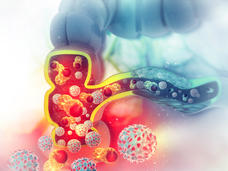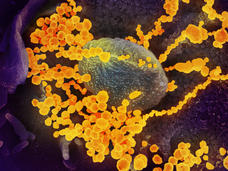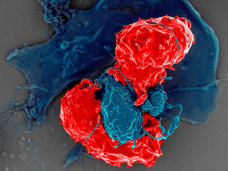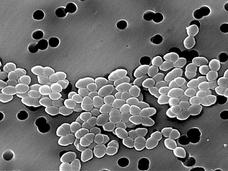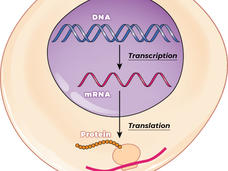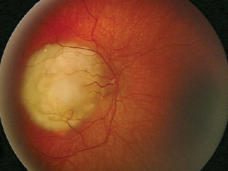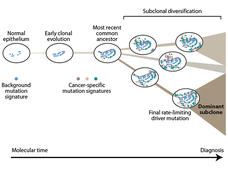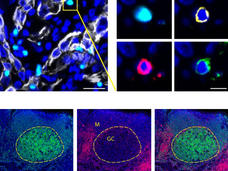Cancer Currents: An NCI Cancer Research Blog
A blog featuring news and research updates from the National Cancer Institute. Learn more about Cancer Currents.
-
For Women with Breast Cancer, Regular Exercise May Improve Survival
Women with high-risk breast cancer who engaged in regular exercise before their cancer diagnosis and after treatment were less likely to have their cancer return or to die compared with women who were inactive, a recent study found.
-
PSMA PET-CT Accurately Detects Prostate Cancer Spread, Trial Shows
For some men with prostate cancer at high risk of spreading, a large clinical trial shows an imaging method called PSMA PET-CT is more likely to detect metastatic tumors than the standard imaging approach used in many countries.
-
Encorafenib, Cetuximab Combination Approved for Metastatic Colorectal Cancer
The Food and Drug Administration has approved encorafenib (Braftovi) in combination with cetuximab (Erbitux) to treat adults with metastatic colorectal cancer whose tumors have a specific mutation in the BRAF gene, called V600E.
-
NCI Part of Federal Effort to Evaluate Antibody Tests for Novel Coronavirus
NCI scientists, along with experts from other government agencies and academic medical centers, have launched a joint effort to help FDA evaluate commercially available antibody tests for SARS-CoV-2, the coronavirus that causes COVID-19.
-
Helping Cancer Survivors Cope with Cancer-Related Anxiety and Distress
Researchers are exploring ways to support the psychological and emotional needs of cancer survivors and how to tailor existing approaches to meet the needs of specific individuals or groups.
-
Boosting Dendritic Cells Helps the Immune System Find Pancreatic Cancer
The number of dendritic cells in a tumor may explain why immunotherapies work for some cancers but not others, a new study suggests. In mice, boosting dendritic cells triggered an immune response that slowed pancreatic tumor growth.
-
NCI Initiative Aims to Boost CAR T-Cell Therapy Clinical Trials
NCI is developing the capability to produce cellular therapies, like CAR T cells, to be tested in cancer clinical trials at multiple hospital sites. Few laboratories and centers have the capability to make CAR T cells, which has limited the ability to test them more broadly.
-
Deaths from Metastatic Melanoma Drop Substantially in the United States
After rising steadily for decades, the number of people in the United States who die each year from the skin cancer melanoma has dramatically dropped in recent years, results from a new study show. Learn what has contributed to the dramatic decline.
-
At NCI, A Robust and Rapid Response to the COVID-19 Pandemic
NCI is lending its tremendous expertise and unique research capabilities to the global response to the COVID-19 pandemic. NCI Director Dr. Norman Sharpless describes some of the COVID-19 specific research activities NCI has initiated.
-
Selumetinib Approved by FDA to Treat Children with NF1
The Food and Drug Administration (FDA) has approved selumetinib (Koselugo) to treat children with neurofibromatosis 1 (NF1), a genetic disorder that causes tumors, called plexiform neurofibromas, to form throughout the nervous system.
-
Single Dose of HPV Vaccine Yields Long-Term Protection from Many Cancer-Causing Types
More than a decade after vaccination, women who had received a single dose of the HPV vaccine continued to be protected against infection with the two cancer-causing HPV types targeted by the vaccine, an NCI-funded clinical trial shows.
-
Women Experience More Side Effects from Pelvic Radiation than Realized
Women with cervical or uterine cancer who received radiation to the pelvic region reported side effects much more often using an online reporting system called PRO-CTCAE than they did during conversations with their clinicians, a new study shows.
-
Experimental Drug Prevents Doxorubicin from Harming the Heart
An experimental drug may help prevent the chemotherapy drug doxorubicin from harming the heart and does so without interfering with doxorubicin’s ability to kill cancer cells, according to a study in mice.
-
Training Cancer Researchers: A Conversation with Dr. Oliver Bogler
NCI’s Center for Cancer Training (CCT) develops training and career development programs for the next generation of cancer researchers. Here, the new CCT director discusses his goals for CCT and the challenges of training cancer researchers.
-
Health of Gut Microbes May Affect Survival after Stem Cell Transplant
In people with blood cancers, the health of their gut microbiome appears to affect the risk of dying after receiving an allogeneic hematopoietic stem cell transplant, according to an NCI-funded study conducted at four hospitals across the globe.
-
Analyzing Tumor RNA May Help Match Patients with Most Effective Cancer Treatments
A novel approach to analyzing tumors may bring precision cancer medicine to more patients. A study showed the approach, which analyzes gene expression using tumor RNA, could accurately predict whether patients had responded to treatment with targeted therapy or immunotherapy.
-
For Children with Retinoblastoma, Disparities Seen across the Globe
Children with retinoblastoma in low- and middle-income countries were, on average, diagnosed at an older age and with more advanced disease than those in high-income countries, an analysis shows. The data provide clues about global disparities in outcomes.
-
Trial Should Change Care for AIDS-Related Kaposi Sarcoma in Sub-Saharan Africa
For people with advanced AIDS-related Kaposi sarcoma in sub-Saharan Africa, results from a large clinical trial are expected to change treatment. In the trial, paclitaxel greatly improved outcomes compared with treatments typically used in the region.
-
Mapping Cancer Genomic Evolution Offers Insights into Tumor Development
Scientists have mapped the evolution of 38 cancer types, noting common gene and protein alterations that occur early, in the middle of, and late in their development. The hope is that these maps create opportunities to identify cancers much earlier.
-
Cancer Moonshot℠ Workshop Highlights Recent Research Advances
Hundreds of investigators participating in the Cancer Moonshot℠ to accelerate cancer research met recently to provide updates on their progress since the initiative was announced in 2016.



